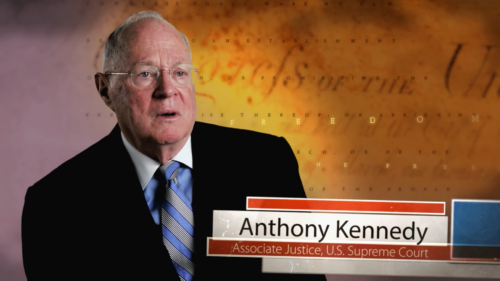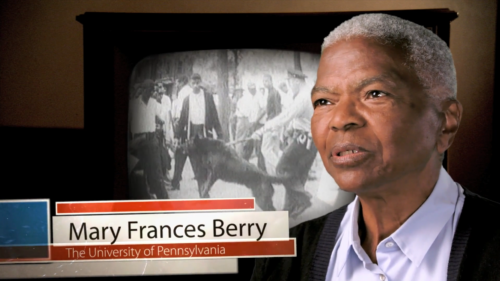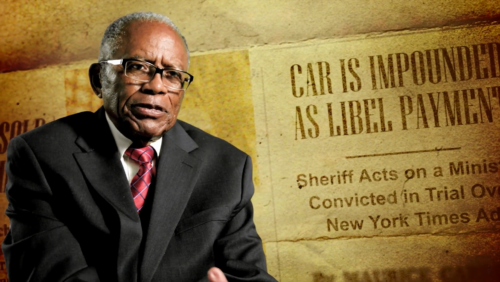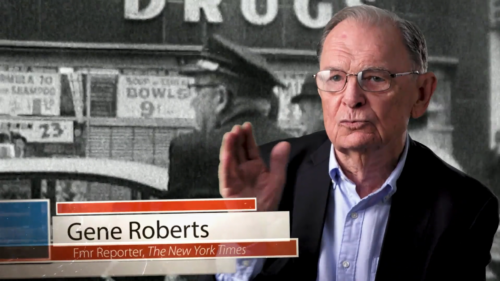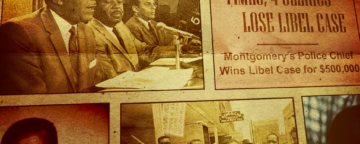Annenberg Classroom has released a new short film about New York Times v. Sullivan, the landmark Supreme Court case on the First Amendment right to freedom of the press.
Released in conjunction with Constitution Day, September 17, the 26-minute documentary examines the relationship of the press to the Civil Rights movement of the 1960’s, and the ways in which proponents of segregation tried to use the courts to prevent coverage of the violence inflicted upon peaceful protestors. As part of Southern states’ efforts to prevent coverage of these events, one tactic was suing newspapers for libel in an attempt to intimidate northern news organizations and reporters, claiming that the papers had published false information that damaged the reputation of individuals or organizations.
The film, “The First Amendment: New York Times v. Sullivan,” is the latest addition to the collection of free, nonpartisan, high-quality resources offered to educators, students, and families by Annenberg Classroom and the Civics Renewal Network, both projects of the Leonore Annenberg Institute for Civics (LAIC) at the Annenberg Public Policy Center (APPC) of the University of Pennsylvania.
The 1964 ruling set a higher bar for public figures to sue for libel and is regarded as a foundational part of U.S. law on freedom of the press. The film debuts at a time when that decision has been called into question by Associate Justices Clarence Thomas and Neil M. Gorsuch, the former writing in 2019 that the ruling and “the Court’s decisions extending it were policy-driven decisions masquerading as constitutional law.”
Freedom of the Press: New York Times v. Sullivan
The film is streaming online at Annenberg Classroom. Among those interviewed in the film are former Supreme Court Associate Justice Anthony Kennedy; historian Mary Frances Berry of the University of Pennsylvania; civil rights lawyer Fred Gray; legal scholar Burt Neuborne of NYU School of Law; journalist and attorney Lucy Daglish of the University of Maryland; former New York Times editor and reporter Gene Roberts; and Amy Gajda of Tulane Law School.
On March 29, 1960, a full-page ad was published in the New York Times titled “Heed Their Rising Voices,” signed by dozens of individuals including Eleanor Roosevelt, Bayard Rustin, Marlon Brando, and many others. The ad aimed to inform the public about the Civil Rights movement and the treatment of Martin Luther King, Jr., to solicit donations to support the movement, and to tell “the story about certain incidents that had occurred in Montgomery, Alabama, that involved demonstrations,” as University of Chicago Law School professor Geoffrey Stone says in the video.
Though no specific officials were named in the ad, Montgomery police commissioner L.B. Sullivan sued the New York Times for libel because he contended that he and his police department were targeted by it. Juries in Alabama ruled that the First Amendment does not protect libel, and that the ad published by the Times counted as defamation. When the case came before the Supreme Court, they unanimously reversed the judgment.
The court ruled that though the ad contained errors, for something to count as libel there must be proof of “actual malice,” meaning that the writer knew the information was false or should have suspected it to be false. This ruling protects the press from frivolous libel claims, making it harder for powerful officials to intimidate them.
The Leonore Annenberg Institute for Civics is planning a series of public and educational programs in March 2024 to commemorate the 60th anniversary of the Supreme Court decision in New York Times v. Sullivan. LAIC also will be putting out a call for proposals from teachers for lesson plans based on the film, and the selected lesson plans will be available in March and posted on Annenberg Classroom.
Watch the film below, or via the Annenberg Classroom site here.
Annenberg Classroom provides resources for middle and high school students and features a library of more than 60 videos, including conversations with Supreme Court justices, interactive games, a guide to the Constitution, and other resources. Previous award-winning films in the Constitution Project series include:
- “Juneteenth”
- “The First Amendment: Student Freedom of Speech”
- “Second Amendment: D.C. v. Heller and McDonald v. Chicago“
- “Freedom of Assembly: National Socialist Party v. Skokie”
- “The 19th Amendment: A Woman’s Right to Vote”
- “Freedom of the Press: New York Times v. United States”
- “Yick Wo and the Equal Protection Clause”
- “Korematsu and Civil Liberties”
